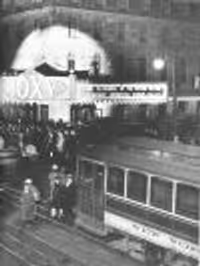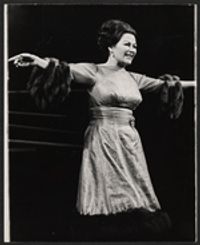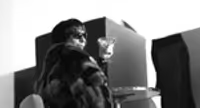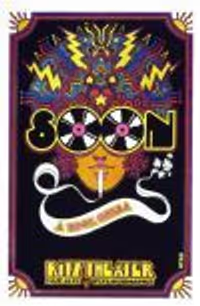Follies OBC: What was Cut/Changed/Slowed Down/etc.
#1Follies OBC: What was Cut/Changed/Slowed Down/etc.
Posted: 6/15/10 at 6:18pmI was just wondering what was changed for the Follies OBC. I've done research and can only find general discussion of the fact that things were altered. What verses, choruses, songs were cute or altered? What was slowed down? And any other general things about it.
#2Follies OBC: What was Cut/Changed/Slowed Down/etc.
Posted: 6/15/10 at 6:18pmWhat wasn't.
#2Follies OBC: What was Cut/Changed/Slowed Down/etc.
Posted: 6/15/10 at 6:40pm
As Roxy implied, almost everything has been tampered with or removed. Keep in mind, most songs are performed at an accelerated tempo as well. I've only listed the textual cuts.
The Overture is missing, although a minute and a half of the Prologue were recorded as part of the beginning of "Beautiful Girls."
"Beautiful Girls" is missing its big instrumental section and the first verse after it.
"Don't Look at Me" is missing some instrumental breaks and the dialogue in the middle of the song.
"Waiting for the Girls Upstairs" is complete.
"Rain on the Roof" is missing.
"Ah, Paris" is missing its entire first half.
"Broadway Baby" is missing everything from "slaving at the five-an-ten" to the final verse, and the montage ending is of the three songs is not included.
"The Road You Didn't Take" is missing only small instrumental bits and the dialogue in the middle of the song.
"Bolero d'Amour" is missing.
"In Buddy's Eyes" is missing only small instrumental bits and the dialogue in the middle of the song.
"Who's That Woman?" is missing its big three minute dance break, but all the lyrics are there.
"I'm Still Here" is missing quite a few bits of music AND two important verses before the "J. Edgar Hoover" verse!
"Too Many Mornings" is thankfully complete.
"The Right Girl" is missing much of its dance music.
"One More Kiss" (available on the CD re-release, but not the LP) is only missing its lead-in, but its absence detracts from the haunting quality of the song.
"Could I Leave You" is complete.
"Loveland" is missing!
"You're Gonna Love Tomorrow/Love Will See Us Through" is missing some music and a couple of verses in the quartet.
"Buddy's Blues" is very odd. All the breaks are gone and the last verse is changed. If I recall correctly, Nelson just repeats the previous verse.
"Losing My Mind" is only missing small bits of music and no lyrics.
"The Story of Lucy and Jessie" is cut to shreds, but all of Smith's lyrics are preserved.
"Live, Laugh, Love" has the nervous breakdown finale removed and the opening chorus as well.
Yes, I'm a Follies obsessive. I know. Glad to help.
#3Follies OBC: What was Cut/Changed/Slowed Down/etc.
Posted: 6/15/10 at 6:56pm
That was very helpful. Thanks.
With that said. Is it worth getting at all? I mean, it's been said that it's worth getting for the performances, even if things are cut out. But, is it really worth paying for?
#5Follies OBC: What was Cut/Changed/Slowed Down/etc.
Posted: 6/15/10 at 7:39pmSo simple. I love it.
#6Follies OBC: What was Cut/Changed/Slowed Down/etc.
Posted: 6/15/10 at 8:01pm
If you don't get the OBC, Edna, I think I'm gonna die.
And read through this whole thread--and download the files at the links.
https://forum.broadwayworld.com/readmessage.php?thread=982568&id=3702495&boardname=bway&boardid=1
#7Follies OBC: What was Cut/Changed/Slowed Down/etc.
Posted: 6/16/10 at 2:39amEdna, I agree: get the album. It's a botch job, but it's the only studio quality recording of the original production. Jonathan Tunick's orchestrations cannot be fully appreciated on a crackly soundboard recording.
#8Follies OBC: What was Cut/Changed/Slowed Down/etc.
Posted: 6/16/10 at 2:41amSuch a disaster of a recording. It's such a shame. That cast deserved so much better.
#9Follies OBC: What was Cut/Changed/Slowed Down/etc.
Posted: 6/16/10 at 5:23amI still don't know that much about FOLLIES but I'm getting my education right here on BroadwayWorld.com
#10Follies OBC: What was Cut/Changed/Slowed Down/etc.
Posted: 6/16/10 at 7:24am
Ljay--imagine being 15 and obsessed with the show and then that album comes out. (They were still 33 1/3 albums then.)
It was a crushing disappointment, a tremendous let-down. The "adults" who were supposed to be in charge had failed. But it was all there was.
And there were no soundboards, no bootlegs--no other audio or video record of my beloved show, other than an audio cassette recorder held up to the various talk shows on which the performers appeared.
Then the "Scrabble" album, the benefit came out, and at least there was some more. But it has always been sad to me that no representation of Follies since has ever been close to adequate.
#11Follies OBC: What was Cut/Changed/Slowed Down/etc.
Posted: 6/16/10 at 10:48am
I've actually always thought that the incomplete Follies OBC is, in an odd way, the most perfect cast album ever made. Would the show be as revered as it is if you could actually listen to the whole original cast, in a studio recording note perfect and beautifully preserved?
The fact that this musical about ghosts and legends and memories of the past and how it fades but still somehow lives on was represented by an incomplete recording is perfect. The only way to truly get the show is through ghost-like fragments and grainy video footage and scratchy old soundboards and truncated studio recordings and full recordings of inferior productions. You'll never be able to truly experience Follies unless you were there.
Somehow I think that if it had a perfect cast album the show would not have half the legend status it does.
And I'll add to the chorus that says that even truncated, the OBC is a must-have.
#12Follies OBC: What was Cut/Changed/Slowed Down/etc.
Posted: 6/16/10 at 10:51amtemms, for some reason, that really put any unsure feelings out of my head. Thank you for that oddly beautiful post.
#13Follies OBC: What was Cut/Changed/Slowed Down/etc.
Posted: 6/16/10 at 11:03am
I came to FOLLIES through the OBCR first when I heard it on a weekly radio program,. In those days (1970s) radio stations would often devote an hour or two to playing COMPLETE original cast recordings on the air. Sometimes the announces would even explain the stories as we went along. When I got the album was was puzzled that half of the songs were marked with a * and footnote indicated "some songs have been abridged for recording." When I got the script from our local library I discovered that 4 had been completely omitted as well. But what WAS on the LP was fascinating and I loved that record.
Like PJ I grabbed the live tribute album to hear longer versions of some songs (and the intriguing cut number "Pleasant Little Kingdom") but it wasn't until the 2 LP set of the 1985 concert came out that I finally got to hear the full score.
The 1987 London cast mucked about with the songs (and the overall tone of the show) too much, but the 1998 Papermill Playhouse album was note-complete and filled out with many of the cut songs.
None of these albums is 100% entirely satisfactory, although the sheer excitement of the Concert version makes it my personal favorite. Still I would never be without the original cast. Get Ted Chapin's fascinating book for am in depth behind-the-scenes look at the show's creation and details of the battles album producer had with the management at Capitol who refused to allow it to be done as a 2-LP set: "Cast albums don't sell." Yet over the years it has probably been one of the label's best sellers!
Cast albums are NOT "soundtracks."
Live theatre does not use a "soundtrack." If it did, it wouldn't be live theatre!
I host a weekly one-hour radio program featuring cast album selections as well as songs by cabaret, jazz and theatre artists. The program, FRONT ROW CENTRE is heard Sundays 9 to 10 am and also Saturdays from 8 to 9 am (eastern times) on www.proudfm.com
#14Follies OBC: What was Cut/Changed/Slowed Down/etc.
Posted: 6/16/10 at 11:11am
Actually, frontrow, the 1985 concert version is not an unabridged version of the score. Much dance/instrumental music is missing, as is the written ending for the Montage (Rain On the Roof, Ah Paree!, Broadway Baby).
And, if you're a real purist, the key changes made for several singers affects the spirit/meaning of some pieces, as does Patinkin's unsung, gasping "Buddy's Blues."
For a complete version of the score, as written, you need either the live recording from Broadway, or the Paper Mill recording.
#15Follies OBC: What was Cut/Changed/Slowed Down/etc.
Posted: 6/16/10 at 11:26am
Yes, the concert did make changes but no more than most cast albums make - adding endings, changing keys, tempos, fabricating dialogue to bridge tow selections, etc. But even so the concert version was for me at the time the cast album that SHOULD have been. I like the Papermill album too, but find some of the tempos slow (maybe they are correct but on the other recordings at least they do seem faster) and it omits the dialogue scene that leads into the Follies sequence and after Ben's breakdown. In fact the album doesn't seem to have any dialogue, maybe Goldman's widow wouldn't allow it? But even so it has a great cast and gives us proper studio (no applause) recordings of all the songs including the Bolero.
"Live" recording (bootlegs) are never an option for me because the sound is generally unlistenable - without the script in front of you you can't make out a lot of the lines. I can't use these on my radio program - legally or morally.
I am so looking forward to seeing FOLLIES in Washington next year. Any word on casting yet?
Cast albums are NOT "soundtracks."
Live theatre does not use a "soundtrack." If it did, it wouldn't be live theatre!
I host a weekly one-hour radio program featuring cast album selections as well as songs by cabaret, jazz and theatre artists. The program, FRONT ROW CENTRE is heard Sundays 9 to 10 am and also Saturdays from 8 to 9 am (eastern times) on www.proudfm.com
Phyllis Rogers Stone
Broadway Legend Joined: 9/16/07
#16Follies OBC: What was Cut/Changed/Slowed Down/etc.
Posted: 6/16/10 at 11:32am
I like the Papermill album too, but find some of the tempos slow
I think they were Sondheim's approved tempos. If I'm not mistaken he battled with Ann Miller, who wanted to record "I'm Still Here" at a faster tempo.
And I think you are right about Goldman's widow. I seem to remember Smaxie saying they were going to record some dialogue, like Sally's during the prologue, but Bobbi Goldman hung them up.
#17Follies OBC: What was Cut/Changed/Slowed Down/etc.
Posted: 6/16/10 at 11:44amI've really grown to love the Papermill recording. I think McKechnie is absolutely divine. And I adore Ann Miller's joyful I'm still here. Big fan of it.
#18Follies OBC: What was Cut/Changed/Slowed Down/etc.
Posted: 6/16/10 at 12:01pmGranted, everyone has their own opinion and own favorite recordings, but what recording, other than the original would each of you suggest to get with it? Most of my albums come in the digital format from iTunes because it is simply the cheapest and easiest way to get them (even if they don't have everything.)They have the concert recording, but not the Papermill. What would each of you say to get?
#19Follies OBC: What was Cut/Changed/Slowed Down/etc.
Posted: 6/16/10 at 12:02pm
I think they were Sondheim's approved tempos.
They probably are, but as Goddard Lieberson demonstrated time and again the tempos that work in the theatre are not always the best for recordings.
I know some people want the albums to mirror EXACTLY the performances on stage, but often without the visuals, the slower tempos seem sluggish on the recordings.
Cast albums are NOT "soundtracks."
Live theatre does not use a "soundtrack." If it did, it wouldn't be live theatre!
I host a weekly one-hour radio program featuring cast album selections as well as songs by cabaret, jazz and theatre artists. The program, FRONT ROW CENTRE is heard Sundays 9 to 10 am and also Saturdays from 8 to 9 am (eastern times) on www.proudfm.com
#20Follies OBC: What was Cut/Changed/Slowed Down/etc.
Posted: 6/16/10 at 12:30pmtemms--that was one of the most perfect things ever written about Follies, possibly one of the most perfect things aver written about live theater in general.
AEA AGMA SM
Broadway Legend Joined: 8/13/09
#21Follies OBC: What was Cut/Changed/Slowed Down/etc.
Posted: 6/16/10 at 1:59pm
"If I'm not mistaken he battled with Ann Miller, who wanted to record "I'm Still Here" at a faster tempo."
That would explain "Ann Miller" snapping at the pianist and the tempo picking up in "I'm Still Weird" on the Forbidden Broadway Cleans Up Its Act recording.
Phyllis Rogers Stone
Broadway Legend Joined: 9/16/07
#22Follies OBC: What was Cut/Changed/Slowed Down/etc.
Posted: 6/16/10 at 2:02pmMy point was that I think the tempos were faster on stage than they were on the recording.
husk_charmer
Broadway Legend Joined: 10/19/06
#23Follies OBC: What was Cut/Changed/Slowed Down/etc.
Posted: 6/16/10 at 2:33pm
PRS-
The way I heard it was they battled, Miller did it at the tempo she wanted and Sondheim said "Fine, do it her way."
The story is in the book on Paper Mill, which I've only skimmed over (I don't have it, and the person I know who does, I avoid)
#24Follies OBC: What was Cut/Changed/Slowed Down/etc.
Posted: 6/16/10 at 2:43pm
Composers are sometimes not the best judges of tempi. They also sometimes have different senses of tempi during different periods of their lives. Perhaps tempo is not a fixed quality.
I was present for several orchestra rehearsals for the 1980 West Side Story revival either attended by--or in one case, led by--Leonard Bernstein.
Not being either a musician or a dancer, I couldn't count out or describe the tempi at which he got the orchestra to play, but I will never forget the electricity of the music under his baton, particularly the Latin rhythms, which he pretty much danced to as he conducted them.
Five years later he conducted the "operatic" studio recording with Kiri Te Kanawa and Jose Carreras. I was shocked and disappointed to hear tempi that even my unmusical ears could recognize as "wrong."
Yet he was the Maestro.
Back to Follies...
Videos








